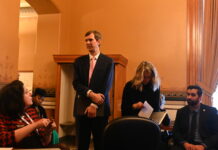FRUSTRATED WITH FAKE NEWS? THIS IS YOUR CHANCE TO DO SOMETHING ABOUT IT!
If you are someone who believes the media refuses to give a fair shake and just report the facts, then consider supporting The Iowa Standard.
The Iowa Standard is a free online news source so we can reach as many people as possible. But we need to raise money! We are asking our readers to help support us as a news alternative entering 2020. If you could, please consider showing a sign of support to The Iowa Standard by making a contribution here. Or, you can use Venmo and make a contribution to @Iowa-Standard-2018.
You could also send a check to:
PO Box 112
Sioux Center, IA 51250
![]()
Iowa’s death tax may be in its final stages if Sen. Jake Chapman has his way. Sen. Roby Smith joined Chapman on Tuesday in advancing a bill to repeal the state inheritance tax and state qualified use inheritance tax.
Chapman calls the tax “the plunder tax.”
Tim Coonan of the Iowa Academy of Trust and Estate Counsel said his group is strongly in favor of the bill.
“Merely for the fact that it is so good for our clients that we think it’d be a great outcome for all,” Coonan said.
Tyler Raygor of Americans For Prosperity said Iowa is one of only a handful of states left who has the plunder.
“According to one publication, just removing this would move our economic outlook from 25th to 23rd,” Raygor said.
Victoria Sinclair expressed support on behalf of Iowans for Tax Relief.
“We think it addresses an inequity that is presently in law,” she said. “We don’t charge inheritance tax for assets distributed to lineal descendants but do anyone else — people who don’t have children or choose to leave property to a business partner. We just think it’s a really good bill and hope to see this discussion continue.”
Rita Carter of the Iowa Conference of United Methodist Church said the group is against the bill.
“Perhaps we don’t understand the total view of this,” she said. “We’re registered against because it’s unfair, inequitable to Iowans who don’t have an inheritance.”
Hart asked what the details of the tax are.
Chapman explained under current law, previous legislatures determined it’s a bad enough tax that they needed to make exemptions for it. And, he added, the limit is $25,000.
“Which isn’t very much for an estate,” Chapman said. “The state collects almost $87 million a year from this plunder tax. It’s taking money straight out of the grave.”
Audrey, a citizen who testified, said she’s one who is discriminated against because she’s an individual without children. The inheritance she leaves behind will be taxed 10-15 percent.
Sen. Herm Quirmbach asked how Chapman planned to make up for the $87 million in lost revenue.
“First of all, Senator, you have been here long enough to know the budgetary process,” Chapman said.
Quirmbach interrupted and brought up concerns over a bill for allowable growth passed on Monday in the Senate.
“I reject the notion that we should be plundering $87 million from the grave to pay for education,” Chapman said. “These are dollars that have been taxed on over and over again. Frankly, we live by the motto of Iowa Nice.
“Iowa’s a nice place to live; it’s a terrible place to die. We need to get rid of that.”
Quirmbach took issue with Chapman asserting money in retirement funds had been taxed. Quirmbach said a lot of money sitting in those funds has never been taxed.
“The double taxation argument is simply not correct,” Quirmbach said. “As far as using it to fund education, the dead people aren’t going to use it. So, we have to be concerned about the future and the earning power of the future generations and we are underfunding education. We are shortchanging our children. And, if you don’t have a way of making up for $87 million in lost funding here, I can’t support the bill.”
Sen. Roby Smith brought up the I-Jobs program.
“I do know that my daughter was not even born when that was voted upon and she will graduate college and be married before that is paid off,” Smith said.
Quirmbach noted the program helped expand the vet hospital at Iowa State and created a lot of construction jobs during the worst-of-all recessions this century.
“It also paid for a hot air balloon museum and an ice house museum,” Smith said.
“Somewhat less attractive investments,” Quirmbach said.
“I’m just trying to figure out how someone could vote to put the future generation on the hook to where my daughter wasn’t even in the womb, and she’s going to graduate college and be married before it’s paid off,” Smith said. “That’s $55 million.
“We don’t invite the government to weddings. We don’t invite government to family reunions. So, why should we be forced to invite the government to funerals and then they leave with a gift bag — an inheritance tax.”
Chapman concluded the meeting with a clear case against the tax.
“Basically you’re telling an Iowan here that because you don’t have children, because you don’t have lineal descendants, you should pay for education, we’re going to take your inheritance and you’re going to pay for education,” he said. “That’s what we heard. That’s what we just heard.
“Make no mistake, that is redistribution of wealth, something I am totally and fundamentally opposed to.”
Chapman said $87 million is no small figure.
“This isn’t a small amount of money that we’re robbing from the grave,” he said. “This is $87 million. It is one of the worst tax policies, perhaps the worst tax policy, we have on the books. I can’t think of anything that has done more damage.
“It is fundamentally wrong. It is absolutely wrong. It is theft. It is government plundering from the grave. And with that, I’m going to sign this out.”












